The Pew Latin American Fellows Program was established in 1990. Since then, Pew has helped advance the scientific careers of nearly 300 past and present Pew fellows. Former Pew fellows can be found in leadership roles in research institutes throughout Latin America, where they are contributing to a vibrant and successful interdisciplinary scientific community. To learn more about the program and how to apply, view this FAQ.
2025 Program Details
Key application dates
- The application portal opens on June 4, 2024.
- Please email [email protected] on this date or later for login information.
- The application deadline is Aug. 14, 2024.
Award eligibility
Candidates must meet all of the following eligibility requirements for the 2025 application process:
- Must have been awarded a Ph.D. and/or M.D. degree between June 4, 2019, and Feb. 1, 2025.
- Preference will be given to applicants who received their undergraduate and graduate degrees from institutions in Latin America.
- Applicants may have obtained their undergraduate or graduate degrees from a school outside of Latin America but preferably not in the United States.
- M.D. candidates whose degree was completed prior to June 4, 2019, may contact the program office for a discussion about eligibility.
- May not have started postdoctoral training in the U.S. prior to Sept. 1, 2023.
- Must have a sponsorship commitment from a lab in the U.S. to conduct postdoctoral research in order to complete the application.
- Applicants will not be considered if they have completed graduate work with their proposed Pew sponsor.
- As part of their application materials, applicants are required to submit a written statement describing how they will further their research career in Latin America after the Pew fellowship and support the development of scientific communities and infrastructure there.
- At the time of application, candidates are not required to have a commitment of a position and laboratory space after the fellowship.
Application review
The 35th class of Pew Latin American Fellows will be selected after a competitive review process in April 2025. After the application deadline has passed, submitted applications will be reviewed by regional selection committees comprising former Pew fellows. The regional committees will invite finalists in their region to interview with committee members and select candidates to move on to the next stage of review.
Each committee will nominate six candidates to be reviewed by the program’s National Advisory Committee in the United States, which will then make the final selection of the 2025 class of Pew Latin American fellows by April 2025. Ten fellowship awardees will be chosen, and the grant will be issued by The Pew Charitable Trusts to their sponsoring institutions in the United States in August 2025.
Terms of the Award
Sponsoring lab
Applicants must identify and confirm a postdoctoral position in the laboratory of an established principal investigator (sponsor) in advance of applying. Many excellent scientists in major research institutions in the United States are interested in having Pew Latin American fellows come to their labs for postdoctoral training. Please see the To Apply page for assistance in finding a sponsor.
Funding terms
The Pew fellowship provides a $30,000 salary stipend in each of two years (24 months total) and an additional $70,000 payment to the sponsoring institution when the fellow confirms plans to return to Latin America.
The $70,000 portion of the award is only for the purchase of supplies and equipment to help establish the fellow’s independent laboratory upon his or her return to Latin America. These funds are not to be used for equipment for the sponsoring advisor’s lab. In order to receive these funds, the fellow must:
- Have a confirmed research position and laboratory space in Latin America
- Submit a written request to Pew at least four months prior to the fellowship end date
The $70,000 payment is made to the sponsoring institutions of the Pew fellows, who will use it to purchase equipment while completing their fellowships in the United States and ship the items to their labs in Latin America.
If the Pew fellows complete the first two years of the fellowship and are not ready to return to Latin America, they have the option to receive a no-cost extension of the Pew grant, continue research in the sponsor lab with financial support from the principal investigator, and remain eligible for the final $70,000 Pew payment should they secure a position in Latin America. The maximum time period of the Pew grant is 60 months. If the fellows do not plan to return to Latin America by the end of the fellowship (60-month maximum), they will forfeit the $70,000 portion of the grant.
No indirect costs are allowed.
Sponsoring lab responsibilities
To ensure that fellows are compensated equitably with other postdoctoral trainees in their sponsors’ laboratories, the proposed sponsor must commit to providing the following:
- Supplemental salary to meet the NIH suggested salary guidelines for postdoctoral fellows: https://grants.nih.gov/grants/guide/notice-files/NOT-OD-23-076.html
- Two years of medical benefits
- A comprehensive training plan for the fellow
If the sponsor is willing to provide continued employment with salary and benefits for the fellow beyond two years, a request may be made to Pew to extend the time period of the fellowship up to 36 additional months (up to 60 months total). However, Pew will not provide additional stipend support during this time.
A proposed sponsor may not commit to more than one applicant per year.
Annual reports
Annual progress and financial reports during the entire grant period are required. Funding for subsequent years is contingent upon timely submission of acceptable financial and narrative progress reports and attendance at the annual meeting in March or April.
Annual meeting attendance
Fellows are required to attend an annual meeting for each of the two fellowship years, and a third meeting to present a brief scientific presentation. All eligible expenses for meeting travel, lodging, and meals are paid by Pew. The meeting provides Pew fellows an opportunity to present their research and also fosters scientific collaboration and exchange with other scholars and members of the Latin American Regional Representative and National Advisory Committees.
National Advisory Committee
Current members of the program's National Advisory Committee include the following:
Chair:
Nogales, Eva, Ph.D.
Investigator, Howard Hughes Medical Institute
Distinguished Professor of Biochemistry, Biophysics and Structural Biology
University of California, Berkeley
Members:
Arteaga, Carlos, M.D.
The Lisa K. Simmons Distinguished Chair in Comprehensive Oncology
University of Texas Southwestern Medical Center
Bezanilla, Francisco, Ph.D.
Lillian Eichelberger Cannon Professor
Department of Biochemistry and Molecular Biology
University of Chicago
Corvera, Silvia, M.D.
Professor, Program in Molecular Medicine
Endowed Chair in Diabetes Research
University of Massachusetts Medical School
De Robertis, Edward, M.D., Ph.D.
Investigator, Howard Hughes Medical Institute
Norman Sprague Professor of Biological Chemistry
University of California, Los Angeles
Fontoura, Beatriz, Ph.D.
Professor of Cell Biology
University of Texas Southwestern Medical Center
Gilbert, Charles D., M.D., Ph.D.
Arthur and Janet Ross Professor
Laboratory of Neurobiology
The Rockefeller University
Harris, Eva, Ph.D.
Professor, Division of Infectious Diseases and Vaccinology
Director, Center for Global Public Health
University of California, Berkeley
Krainer, Adrian, Ph.D.
St. Giles Foundation Professor
Cancer Center Deputy Director of Research
Cold Spring Harbor Laboratory
Rothlin, Carla, Ph.D.
Dorys McConnell Duberg Professor of Immunobiology
Yale University School of Medicine
Sabatini, David D., M.D., Ph.D.
Professor and Chairman, Department of Cell Biology
New York University School of Medicine
Villa, Elizabeth Ph.D.
Investigator, Howard Hughes Medical Institute
Professor of Molecular Biology
University of California, San Diego


